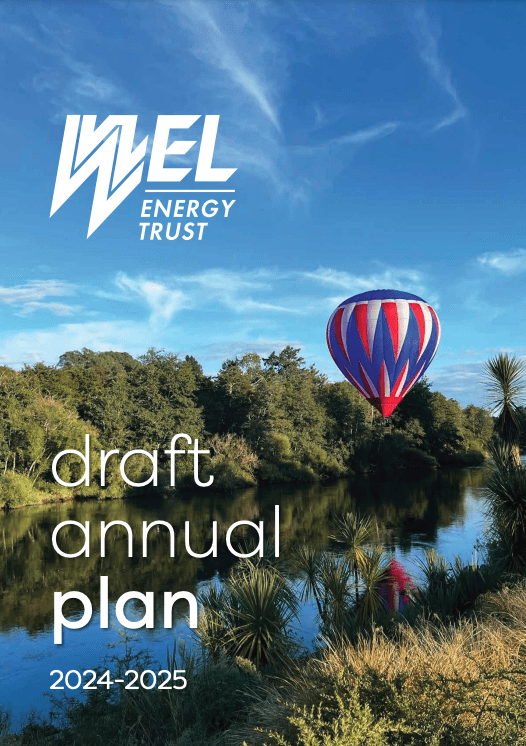Since its inception, the Waikato Wellbeing Project (WWP) has been honoured to be supported by a broad range of people and organisations, both financially and in-kind. Amongst these, the Waikato Regional Council (WRC) and WEL Energy Trust developed the original concept for the project, and the WEL Energy Trust is our most significant financial supporter. This relationship is captured in a Partnership and Funding Agreement covering the first 5 years of the project. The agreement was signed by the Chairs of the Waikato Regional Council and the WEL Energy Trust.
The WEL Energy Trust has recently released its draft 2024/25 Annual Plan. Without warning this proposes a 50% reduction in WWP funding for the coming year, with indications of greater reductions in year 5. The proposal is contained in the Trust’s draft Annual Plan, which you can view here:
WEL-Energy-Trust-2024-25-Revised-DRAFT-Annual-Plan-for-Consultation.pdf (welenergytrust.co.nz)
Anybody can submit to the draft plan, and we urge you to be part of this conversation by making a submission. Submissions are open until 5pm Wednesday 20 March and need to be sent to info@welenergytrust.co.nz.
There is no format to follow, just send an email with your views and proposals. The WWP’s submission will ask that the WEL Energy Trust honours its original commitments. We encourage everybody who supports the project, wellbeing and sustainable development in the Waikato to make their voices heard also.
You can also come to the next meeting of the WEL Energy Trust 2:30pm on 26 March at Perry House, 360 Tristram Street Hamilton, to speak to your submission or generally support the WWP.
We would love you all to submit, and attend the meeting, so WEL Energy Trust can make quality and well-informed decisions, and especially understands that the WWP project team is just the visible part of a much bigger community of wellbeing leaders in our region. Some background information is set out below.
Background
The WEL Energy Trust-Waikato Regional Council Partnership and Funding Agreement committed WEL Energy Trust to providing $3m over 5 years for the WWP. Some key points:
The purpose of the funding is to establish a backbone organisation, widely understood to be a key element of any successful collective impact programme.
The agreement refers to a commitment to be strategic, expanding support beyond traditional grant making. Funding of the WWP for 5 years reflected this new way of creating impact.
The partnership relies on an ongoing engagement and collaboration commitment between the Council and the Trust- in other words it is a commitment to joined leadership
Some relevant principles of the agreement include:
o Respect – parties resect treaty principles of partnership, protection and participation
o Transparency – there will be no surprises in working arrangements, expectations or relationships
o Reciprocity – the parties will share information, ideas and opportunities that will achieve the shared vision
The agreement defines the nature of the relationship as one based on good faith and respect for each other’s views. The agreement states that if matters arise that may be of interest to any Party, a contact person designated by each party is to be informed.
The agreement was entered into in good faith. The WWP project can only operate effectively if there is trust that the agreement will be honoured by both parties and that its objectives are met. To be effective, the WWP needs assurance of commitment so that it can partner with other wellbeing organisations in the Waikato and New Zealand, and can build and retain the capability and capacity it needs to continue to meet its objectives.
The funding committed in the agreement had the following key attributes:
Funding for 5 years, subject to the project meeting agreed milestones and criteria
Funding from WEL Energy Trust to reduce over the 5 years, and co-funding from others to inversely increase, so that overall funding is maintained
Co-funding from other partners, both in cash and in kind
Total funding from WEL Trust of $3m, on the following schedule:
The WWP has, since its operational phase started in 2021, reported fully every 6 months to the WEL Energy Trust as required by the agreement and keeps in close contact with Trust officials. The feedback we have received from the Trust has always been that we have fully met the milestones and criteria. When invited, we have attended Trust Board meetings to update the trustees in person on the progress we have made. We presented to the new trustees in September 2023.
We hold two Manu Taki hui every year and representatives of the WEL Energy Trust are always invited and have always attended the hui. The WWP also regularly publishes a stakeholder newsletter (such as this report) about every second month, which goes to about 1000 people and organisations including all Trustees. Since early 2021 we have now published 18 newsletters. We post almost daily on our own website, LinkedIn, Facebook and Instagram. Our Lots of Little Fires videos have been viewed over 200,000 times on YouTube alone.
In terms of co-funding, we have worked with sponsors, funders such as Trust Waikato and supporters to meet the criteria in the agreement. This is a combination of cash, sponsorship and in-kind support, especially the time gifted by Manu Taki and key project supporters. The results to date are shown below.
What this shows is, at the end of calendar year 2023, the WWP was well ahead of its co-funding commitment by 72%. We already have another $300,000 cash committed by Trust Waikato in years 4 and 5 for Te Ara Poutama, our wellbeing knowledge initiative.
WEL Trust Draft Annual Plan
Each year the WEL Trust develops a draft annual plan which it releases for public feedback. This year’s draft plan was released on 28 February by public email. The WWP received the draft plan at the same time as everybody else, had not been advised of any concerns in the development of the plan and was not made aware of any proposed changes.
The changes proposed in the Annual Plan are summarised in the table below, with changes in red. We have not been advised of the Trust’s proposal for 2025, however we are concerned that the same approach or worse may be taken. The loss of funding to the WWP is proposed to be $200,000 but could be as high as $500,000 over two years.
The proposal is contained in the Trust’s draft Annual Plan, which you can view here:
WEL-Energy-Trust-2024-25-Revised-DRAFT-Annual-Plan-for-Consultation.pdf (welenergytrust.co.nz)
A key point to note is that the reductions in funding for the WWP occur at the same time as the Trust proposes to increase its community granting programme by 47% to $10.3m. This is to be supported, but it should not happen at the expense of the Waikato Wellbeing Project.
Our Response
As set out in the Partnership and Funding Agreement:
The Trust and the WRC agreed to establish a 5-year fund to support a backbone organisation for wellbeing leadership in the Waikato. This is entirely consistent with best international practice on collective impact[1] and represented best practice thinking from the WEL Energy Trust
The WWP funding was not a grant, it was a strategic investment. As stated in the agreement, by committing to a multi-year funding programme, the partners were moving “beyond grant making”.
The project is founded on a strong relationship between the WEL Trust and the Waikato Regional Council that includes values such as respect, transparency and reciprocity
In the absence of any clearly articulated reasons, reducing our funding does not honour the Partnership and Funding agreement either in spirit or in letter. Our request will be that the WEL Energy Trust honours the Partnership and Funding Agreement and that WWP funding is returned to that in the agreement for 2024 and 2025.
The key points in our submission will be:
The WWP thanks the WEL Energy Trust for having the considerable foresight , with the WRC, to create and fund the WWP. We support the Trust’s strategic intent, especially the 47% increase in community grants to $10.3m
Despite the signed Partnership and Funding agreement for the project, there was no opportunity for the WWP Kaitiaki Advisory Board, the Waikato Regional Council or the project executive to understand and respond to the proposed funding cut before the Trust released its draft plan
The WWP has met its agreed performance objectives, grown co-funding and kept the Trust and all stakeholders fully informed of progress. There is always more to do but there are no performance-based grounds for a funding reduction
The 5-year funding and support for the WWP was agreed to in good faith with the Waikato Regional Council and the project has operated on trust that it will be honoured. The proposed change is an unannounced departure from that agreement.
A “discussion with WRC on future funding models and project deliveries” is welcome, but to be consistent with the principles of the Partnership and Funding agreement should have been held before the draft plan was released
The proposed change is a significant (50%) reduction in funding for 2024/25, which would impair the WWP’s ability to deliver value with Manu Taki, co-funders and partners
As set out in the Funding and Partnership agreement, the Trust’s funding for WWP is already set on a transitional pathway to end in 2026. There is no justification or benefit from changing the agreed funding profile
The Trust’s 2024/25 contribution to the WWP is only 3.8% of their proposed $10.3m grant distributions. This is already significantly lower than the 7.1% in 2023/24. The WWP’s financial impact on the Trust’s balance sheet is already very low and reducing, relative to the value created.
The relatively minor financial benefits to the Trust of a further 1.9% reduction are out of proportion to the negative impacts on the WWP and its work on wellbeing in the region and wider. This is especially so given that the Trust has an additional $3.3m to distribute in 2024/25- which is greater in one year than the total agreed allocation to the WWP over 5 years.
[1] Collective Impact (ssir.org)





